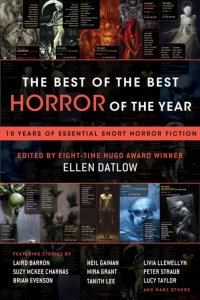Ian Mond Reviews Crosshairs by Catherine Hernandez
 Crosshairs, Catherine Hernandez (Atria 978-1-982-14602-3, $27.00, 272pp, hc) December 2020.
Crosshairs, Catherine Hernandez (Atria 978-1-982-14602-3, $27.00, 272pp, hc) December 2020.
Catherine Hernandez’s vivid, angry, outspoken dystopian novel, Crosshairs, begins in a basement somewhere in Toronto. There we meet Kay, a self-identified “Queer Femme Jamaican Filipino man” hiding behind a furnace, sleeping on a bed made from cardboard, and spending his days narrating a “Whisper Letter” to his “beautiful Evan.” He recounts the sheer joy of dancing to Liberace’s “Clair de Lune” and working at a gay bar where he’s introduced to the bedazzling world of Drag and the thrill of performing on stage as the delightful and glorious Queen Kay. He also recalls the unprecedented floods that devastated Canada, leaving so many poor and destitute, and from that wreckage the rise of the Boots, an extreme right-wing militia, promising a Renovation, a revitalised country, where those regarded as “Other,” the “extremists, bogus refugee claimants, illegal immigrants, and sexual deviants” – code for people of colour, the disabled and the LGBTQ2S community – are sent to labour (“concentration”) camps. However, the day is coming when Kay will leave the basement, when he will take up arms and join the fight against the fascists and their oppressive regime.
I know it’s lazy to compare a dystopian novel to Margaret Atwood’s The Handmaid’s Tale, as if this one book, as incredible as it is, defines an entire sub-genre, but with Crosshairs, the comparison is appropriate, not so much in how the two books are similar (chronicling the uprising of an extremist, repressive regime in North America) but rather in how they differ. For one, whereas Atwood’s dystopia is localised to the United States, with Canada a relative safe-haven, Hernandez turns that on its head by having the fascist regime take root in Canada and then spread its toxic ideology to the States – marketed with the chillingly anodyne catch-phrase “Two Nations, One Vision.” Where Atwood’s novel is very much a response to the emergence of the Christian Right and the very real (and still present) threat to a woman’s right to choose, Hernandez’s interests are intersectional, shifting the focus from second-wave feminism to issues of race and identity. Most important of all, while The Handmaid’s Tale is a singular take on oppression through the eyes of an unnamed narrator, Crosshairs not only names its protagonist, but Kay provides space for others to tell their story. As such, we encounter Bahadur, a transgender refugee who, through luck and bravery, avoids being rounded-up by the Government, and Firuzeh, a social worker who experiences the brutal conditions of the labour camps first hand, and Liv, who owns the house Kay is sheltering in at the beginning of the novel and who employs her looks and her whiteness to infiltrate the upper echelons of the Boots.
Crosshairs, though, is so much more than a contemporary take on The Handmaid’s Tale. It’s also a story about the importance of allyship, of white people understanding when to step forward and assist, and, crucially, when to take a step back. This attitude is embodied by Beck, a queer, white man and an ex-soldier who, disgusted by his racist tendencies, decides to join the Resistance, using his parent’s farm as training camp where he drills survivors like Kay and Bahadur for the battle to come. At one point, Beck’s mother, fearful for her son’s life, asks him why he and Liv felt the need to lead the fight against the Boots. In response Beck says,
We’re not leading it. What we’re doing has been planned by activists who have fought their entire lives just to live, to work, to love…. They have done that work. And believe me, Mom. They had to do a lot of work on me to get me where I am now. I will continue to do that work, on myself and those around me, for the rest of my life. And you know what? It feels good. It feels good to wake up and stop pretending. It feels good not to be afraid, not to set myself apart, not to defend what wasn’t mine in the first place.
Crosshairs illustrates (if there was ever any doubt) how the hatred for the “Other” runs deep in America and across the western world. And yet, for all the harrowing imagery of violence and subjugation, of people rounded up and slaughtered because of the colour of their skin and their gender identity, Hernandez encourages a sense of hope; of white folks working alongside marginalised and vulnerable communities, not as saviours but to provide support in the fight against the forces of hatred and oppression.
This review and more like it in the January 2021 issue of Locus.
 While you are here, please take a moment to support Locus with a one-time or recurring donation. We rely on reader donations to keep the magazine and site going, and would like to keep the site paywall free, but WE NEED YOUR FINANCIAL SUPPORT to continue quality coverage of the science fiction and fantasy field.
While you are here, please take a moment to support Locus with a one-time or recurring donation. We rely on reader donations to keep the magazine and site going, and would like to keep the site paywall free, but WE NEED YOUR FINANCIAL SUPPORT to continue quality coverage of the science fiction and fantasy field.
©Locus Magazine. Copyrighted material may not be republished without permission of LSFF.







